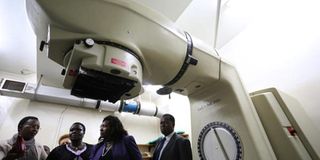Lack of knowledge on cancer ‘worrying’

Members of the National Assembly's Health Committee examine a radiotherapy machine at the Kenyatta National Hospital in Nairobi on April 28, 2015. FILE PHOTO | BILLY MUTAI |
What you need to know:
- Anti-cancer crusader out to debunk myths.
- Meeting in Mombasa shows many residents are in the dark about causes of the disease.
Many people still lack information about the causes of cancer and its treatment, in spite of the campaigns aimed at bringing more attention to the disease.
Participants in a conference held at Our Lady of Fatima Kongowea Catholic Parish in Mombasa were told that myths about cancer instil fear in people, who hesitate to seek treatment.
The moderator of the meeting, Ms Gladys Etemesi, said many people shy away from seeking early treatment. She said knowledge about the disease is scant at the grassroots because of limited access to information.
Ms Etemesi, a nurse at the Kilifi County Hospital, is a cancerous tumour survivor, who is also an anti-cancer crusader at the Coast.
“Wrong information is negating the war on cancer. The meeting revealed shocking details,” she said.
Ms Etemesi said a man and his wife said they had been avoiding intimacy because they fear cervical cancer.
She said a husband in his 40s had been told by his wife that she had heard from other women that engaging in sexual activity frequently increases chances of one getting cervical cancer.
Ms Etemesi said exposure to certain chemicals, such as mercury, and lifestyle and genetic factors lead to cancer and not regular coitus by couples.
She said the human papillomavirus causes cervical cancer, which attacks only women.
Young mothers at the meeting said they feared undergoing tests because they had been told that cervical cancer victims cannot conceive.
“Cervical cancer does not prevent conception. However, it is good to get tested for early medical intervention,” said Ms Etemesi.
She allayed the fears of a man who said he may be suffering from stomach cancer because he had lost his appetite for food.
Ms Etemesi said many men dread going for prostate cancer tests out of fear that they would become sterile after treatment.




